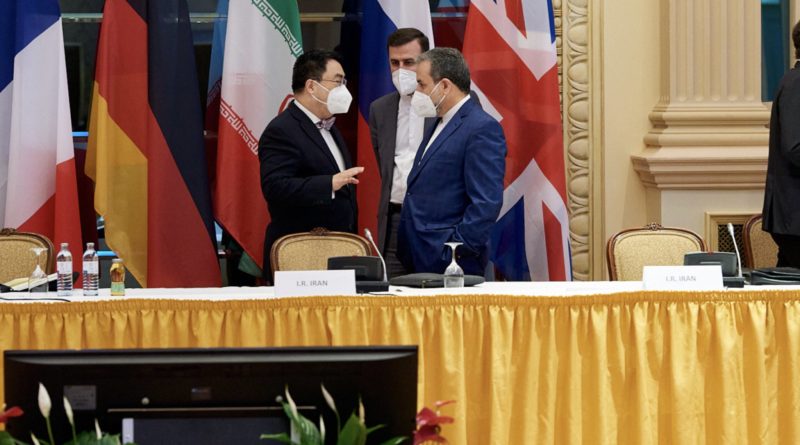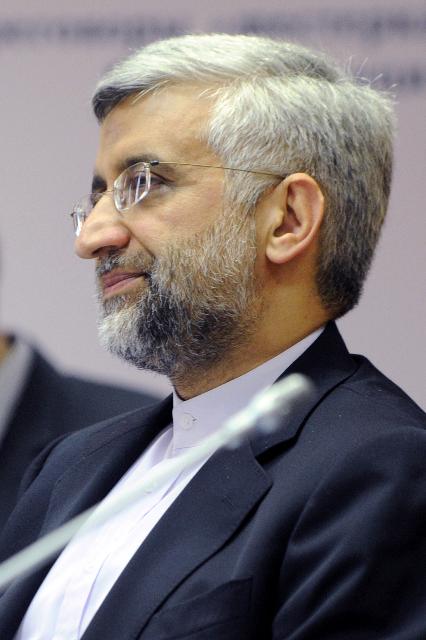Fix the Iran nuclear deal. Not easy. Six years have passed. Mistrust has set in (Enrique Mora)
(B2) Why are the Vienna talks on the Iran nuclear deal so complex? Why are they important for Europeans? How did Iran and the United States drift apart so quickly? Enrique Mora, un of the main actors in the process gives explanations. A rare point of view, to be read carefully, to fully understand all the issues of this negotiation

In an article published at the end of April in Politica Exterior, a Spanish journal specializing in diplomatic issues, the Political Director of the European Diplomatic Service (EEAS), Enrique Mora, describes all the complexity of negotiating a new agreement where there is normally..." nothing to negotiate ". " Both the nuclear commitments and the sanctions to be lifted are expressly included in the JCPOA "He says.
In addition, the negotiations are marked by the hostilities and reluctance that exist not only in Tehran and Washington, but also in the Arab capitals. " This mistrust marks the format of the negotiations », and is illustrated for example by « the impossibility for the Iranian side to physically meet the American delegation ».
Another notion to take into account: the time elapsed since the signing of the agreement (in 2015) and the geopolitical changes since then. " It is complex to manage a negotiation in which the text has been approved by the parties [and that] now, being the same in its literal sense, generates different perceptions »
A negotiation on the razor's edge
Two negotiations in one
In fact, there is not a negotiation, but " two parallel processes in progress in Vienna. The first is quite formal ", within the Joint Commission, which brings together the six participants in the agreement (France, Germany, United Kingdom, China, Russia and Iran), plus the European Union which holds both the presidency and the coordination of the meeting. It is indeed the High Representative of the EU, Josep Borrell, who has been appointed as the coordinator of the commission. The second process, much more informal, takes place between Iran and the United States, through an intermediary.
Iran and USA talk through EU
That's what we call " proximity negotiations, in diplomatic jargon ". Either a modality in which the parties have " no face-to-face meetings due to political limitations”, but are present in the same physical space. In this case, they are " very close », a few tens of meters away, in two hotels located on the Viennese Kärntner Ring. And discuss through the EU coordinator who plays " here the role of facilitator ».
Challenge: restore the delicate original balance
The goal of both processes is the same: to make the JCPOA a " operational and efficient ". To do this, " it is necessary to restore the delicate balance on which it was originally founded: the guarantee that the Iranian nuclear program is exclusively for civilian purposes, on the one hand, and the lifting of the sanctions imposed by the international community, the other ". These sanctions were adopted when the suspicion of a military program proved " more than founded ».
The devastating effects on the deal of 'Trump' politics
Maximum pressure policy failed
« The balance tumbled when Donald Trump's [US] administration scrapped the deal, reimposed previously lifted sanctions and added many more under the so-called 'maximum pressure policy''”. A policy that failed in its aim to bring Iran back to the negotiating table and force the Islamic Republic to accept what the previous US administration considered a more favorable deal ».
The negative effect of extraterritorial sanctions
The effects on the Iranian economy have been devastating ". Hand in hand with nature extraterritorial of American sanctions, they led to the “ withdrawal of virtually all international economic players and a prolonged drought in investment or trade relations ". Despite this, the Islamic Republic has " continued to abide by the agreement for just over a year ". A point that is often overlooked in negotiations.
Iran's nuclear slippage
Iran has " finally started making nuclear decisions that “ were clearly deviating of the JCPOA. In recent months, these decisions have been accelerated with decisions of a " indisputable seriousness », such as 60% enrichment or the production of uranium metal. All these decisions, and those in progress, are integrated into the talks in Vienna as “ issues to be resolved ". " Not the least of the problems is that the focus of the talks is changing as Iran adopts new measures. The goal moves while the game is being played »
The main obstacles, political, of the discussion
A series " obstacles enamel the discussion. " In both capitals, the deal probably has more detractors than supporters. The reasons are various.
The American prism of Israel and the Gulf
In the United States, at historical hostility " towards the Islamic Republic, is added a current of thought " highly influential in Congress, more concerned with tailoring US policy to the interests of its most important ally in the region than analyzing US national interest in the Middle East ". The Trump administration has been the " paradigm of this current of thought, subordinating the relations between the United States and the Arab countries to the legitimate interests of Israel ».
Nationalist patriotism in Iran
In Iran, behind the nuclear issue is reflected a " fundamental trend for several years ": the replacement of the Islamic ideology, " much less appealing to later generations ", through " a nationalism that has always had a huge impact on Iranian public opinion ". From this point of view, " any limitation of the nuclear program, which no one publicly claims to be military, » is considered a " unacceptable interference ". " The so-called 'North Korean example' does not escape this perception either.. “This situation of” disaffection " Traducting by, " with a perceptible force at every minute of the negotiation, by the fear of "going too far" in the proposals, whether in terms of lifting sanctions or returning to nuclear commitments »
Extraordinary mistrust between Tehran and Washington
The " second hurdle " East " the extraordinary mistrust between the United States and Iran, which dates back decades, and which the Trump administration has considerably sharpened ". This mistrust marks the format of the negotiations, the impossibility for the Iranian side to physically meet the American delegation on the express order of the Supreme Leader, and therefore the proximity talks. “But it could also” mark possible results ».
Arab and Israeli hostility
Third hurdle: the extraordinary hostility » to the agreement of a « good part of the Arab countries and, of course, of Israel ". " But here too, something is changing. A good example is the statements of Rayd Krimly, director of analysis and forecasts at the Saudi Ministry of Foreign Affairs, who now places the restoration of the agreement as a first step and not as something negative, rejectable, political official of the kingdom until then". Even on the Israeli side, it “there are movements of prestigious personalities who have occupied important roles in Israeli foreign and security policy ».
A high political risk negotiation for everyone
Participating in the talks asks each government “ to invest considerable political capital to carry them out. To this must be added the perfect asymmetry » political situations. We have a president (Joe Biden) who “ starts in Washington and a president (Hassan Rohani) who " comes to the end of term in Tehran.
Negotiate on what?
A striking element of this negotiation is that normally " there is nothing to negotiate ". Both the nuclear commitments and the sanctions to be lifted are expressly included in the JCPOA. Some reverting discussions should be limited to taking reverting minutes. And yet it's not that simple »
The 'wear and tear' effect of time
The difficulty comes, elapsed time "since the signing of the agreement (six years!), " experiences of the parties, very negative in the Iranian case, and the perceptions that time has aroused in a context of deep mistrust ». Not to mention the " geopolitical change since January 2015 which also translates to " different attitudes other participants to the agreement. He is " complex to manage a negotiation in which the text has been approved by the parties and now, being the same in its literal sense, it generates different perceptions ».
The unplanned withdrawal of a partner
The first thing time brought was " something that, apparently, no one expected: the withdrawal of one of the parties ". Unexpected. The proof: to at no time was it proposed to introduce provisions in this regard into the agreement, which is common in other international instruments”. Beyond the immediate effects on the agreement, this withdrawal has political consequences on the negotiation of the return. " What once required a change of regime, now a simple change of government is enough »
American polarization
This " polarization » in the United States, which translates to " sudden shifts, sometimes 180 degrees, in foreign policy ", had effects " devastating for the JCPOA. The Iranian side is now seeking to " have the guarantee that this will not happen again, that there will be no further withdrawals in the future, or at least that there will be guarantees for several years for economic players ". Obtaining such a guarantee is highly improbable ". It is difficult to prevent the democratic game of alternation in force in the United States.
The acquisition of indelible nuclear know-how
If Tehran has always been careful to point out that all decisions " contrary to the nuclear agreement », were « reversible — with the argument 'we can stop enriching uranium at any time and return to the limit set in the agreement' — his scientific advances seem to be hardly reversible. " Anyone familiar with thermodynamics knows the existential irreversibility inherent in any process projected through time. ". " I'm afraid there are no exceptions here. To cite just one example, the knowledge acquired by Iranian scientists is irreversible. They gave good proof of that in speed and in fact, they backed out of the deal in just three months. »
A lesson for the European Union
In this negotiation, the European Union is doing two things at once. It coordinates multilateral negotiations and facilitates bilateral negotiations (between the USA and Iran), and it defends its interest in non-proliferation and stability in the Middle East. " There are few precedents for this duality. This is an element to add to the ongoing debate on the relevance of the EU in a different, much more complex geopolitical environment. "In short, " this is a lesson for the European Union ».
(Word by Enrique Mora - translated and highlighted for readability by NGV - titles and intertitles are by the editor)
Reprinted with permission from the author and Politica Exterior
Read also: The best Vienna coffee for the diplomatic spirit?


